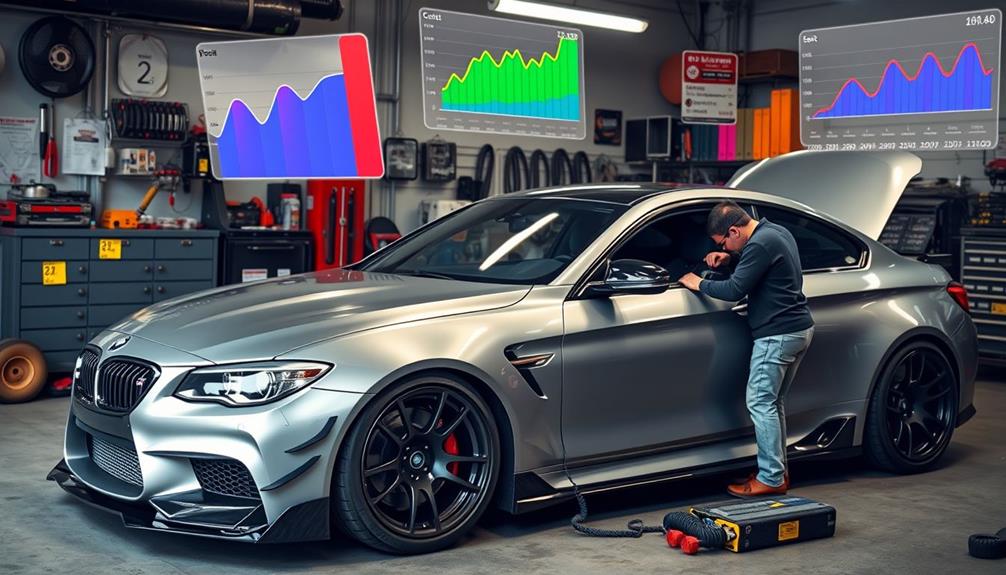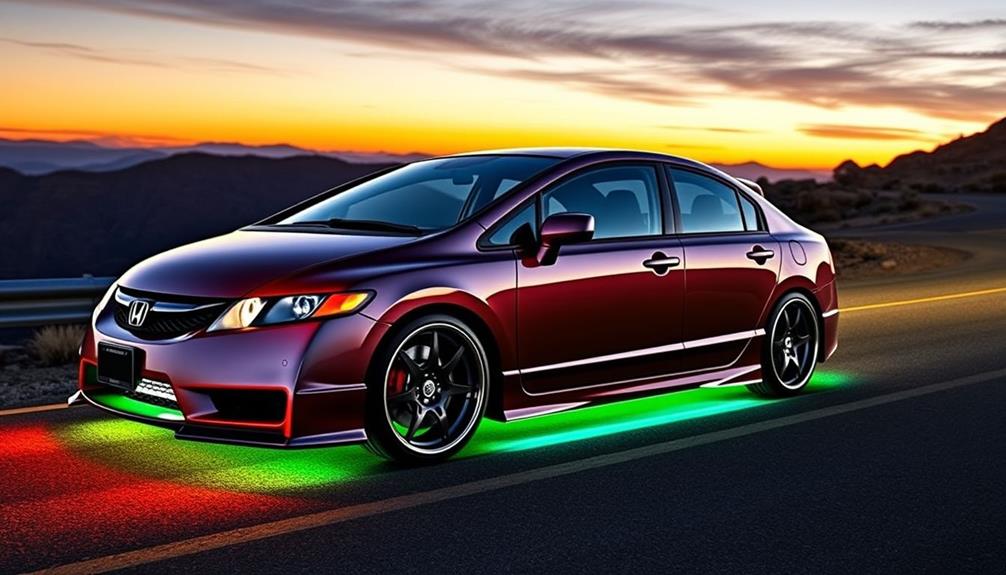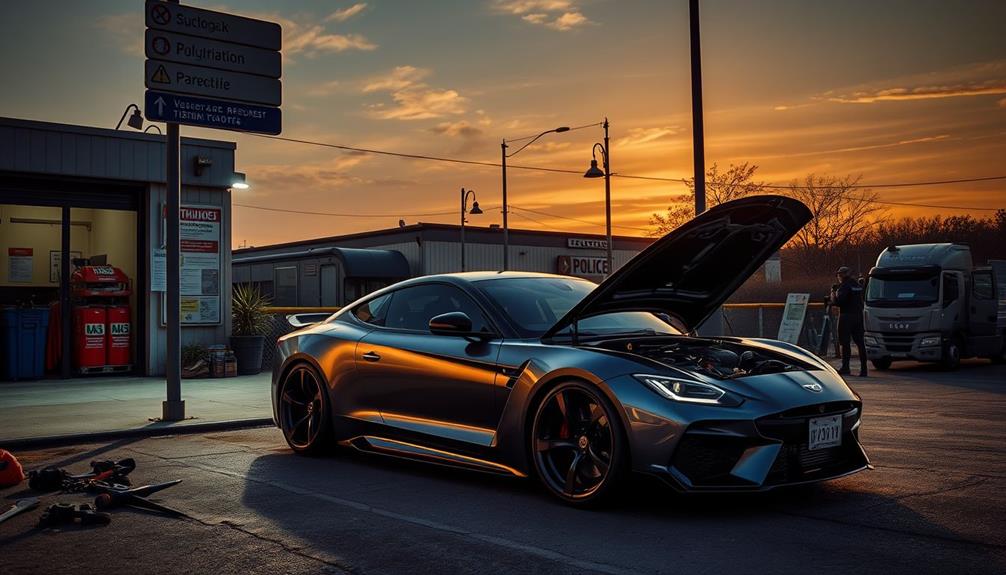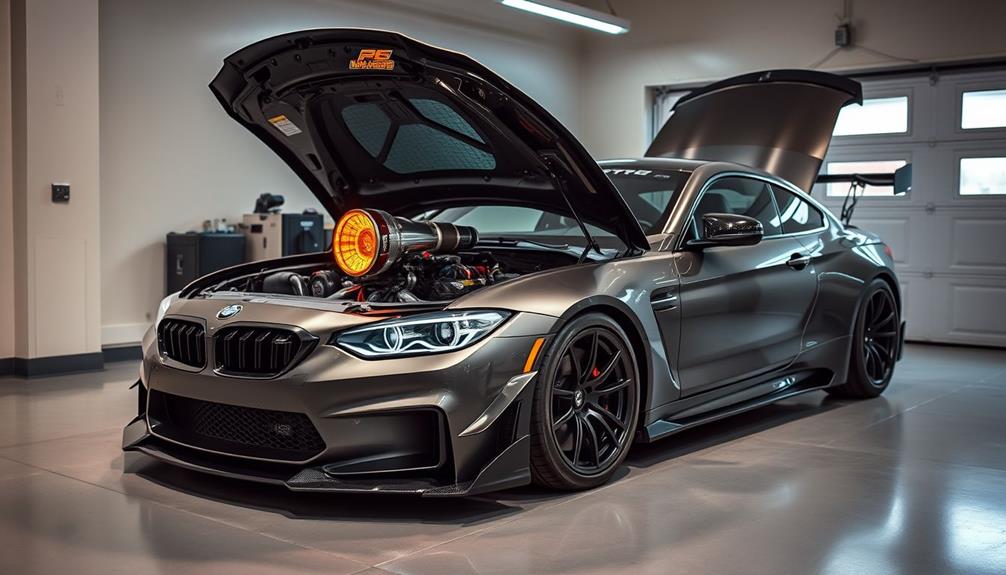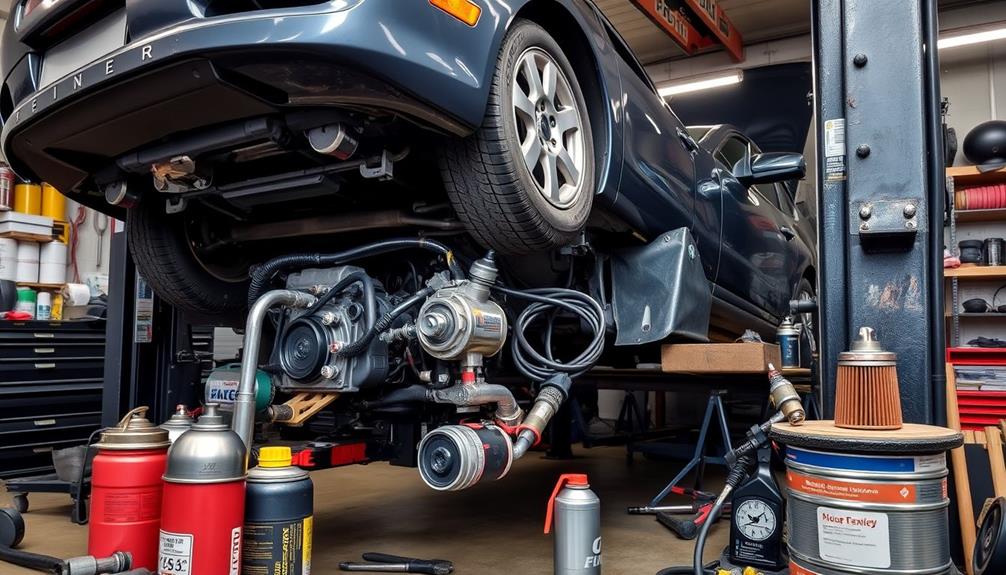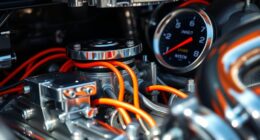Car tuning costs can range from $200 for basic ECU tuning to over $10,000 for advanced modifications, like supercharger installations. Your vehicle's make and model, the type of tune you choose, and additional performance upgrades will impact the final price. Don't forget to factor in labor costs, which vary by shop and location. Safety and legal compliance are vital, as failing to meet local laws can lead to fines or registration issues. Before moving forward, it's wise to consult a professional to guarantee you make informed decisions. Stick around to uncover more tips and insights on your tuning journey.
Key Takeaways
- Basic ECU tuning ranges from $200 to $500, while advanced custom tunes can cost $1,500 or more.
- Performance upgrades, such as exhaust systems or turbochargers, can add $500 to $10,000 to your tuning costs.
- Labor costs vary significantly based on location and the shop's reputation, affecting overall tuning expenses.
- Ensure compliance with local emission laws and safety standards to avoid legal issues and registration problems.
- Research tuning shops with good reputations and consider remote tuning options for budget-friendly performance upgrades.
Factors Influencing Tuning Costs
When it comes to tuning costs, several key factors come into play that can greatly affect what you'll end up paying.
First off, the type of tune you choose greatly influences your expenses. Basic ECU tuning typically ranges from $200 to $500, while advanced custom tunes can escalate to $1,500 or more, especially if you've made performance upgrades to your car.
Your vehicle's make and model also matters. High-end or rare models often require specialized knowledge, which can increase labour costs and overall tuning expenses.
If you've upgraded parts like exhaust systems or turbochargers, expect to add anywhere from $500 to $10,000 to your total cost, depending on their quality and complexity.
Additionally, labor costs vary by location and shop reputation. Skilled technicians may charge more for their expertise, directly impacting the final price of the tuning service.
Finally, keep in mind that compliance with local laws and emission regulations can influence costs, as modifications might lead to non-compliance and potentially additional expenses for legal adjustments.
Understanding these factors will help you prepare for the financial aspect of tuning your car.
Breakdown of Tuning Expenses
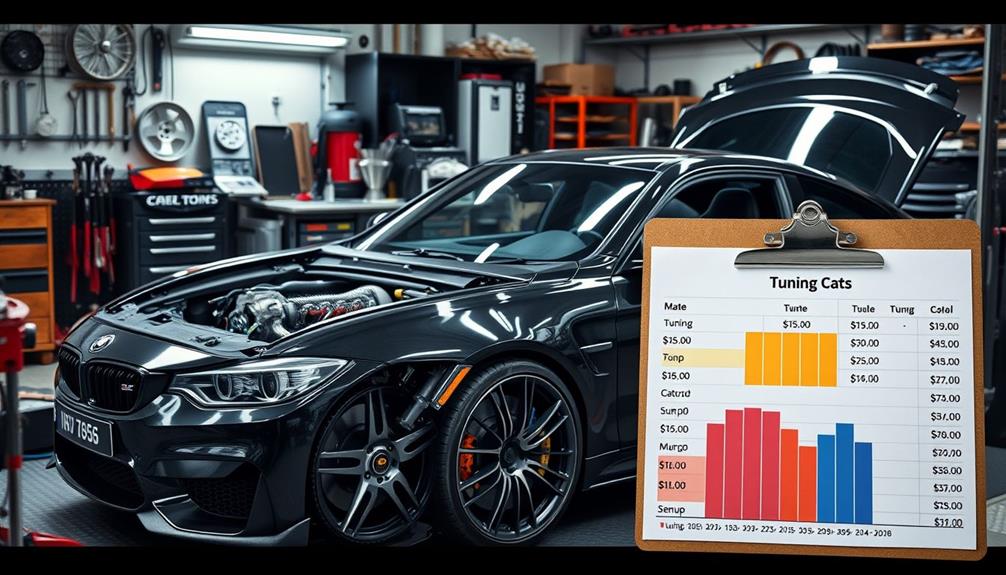
Understanding the breakdown of tuning expenses can help you budget effectively for your car modifications. When tuning your car, the cost of tuning largely depends on the type of upgrades you choose.
Basic Engine Control Unit (ECU) tuning usually ranges from $200 to $500, while advanced tuning with custom adjustments can set you back between $500 and $1,500.
If you're looking to enhance performance further, investing in performance parts, like exhaust and intake upgrades, typically adds $500 to $2,000 to your overall costs.
For those considering significant upgrades, such as turbo or supercharger installations, expect to spend anywhere from $2,000 to $10,000, influenced by the parts and labor needed.
Additionally, don't overlook dyno tuning. This process, which provides precise performance data and adjustments, usually costs between $300 and $1,000.
Overall, you can anticipate tuning expenses to range from $300 to $1,500, with potential horsepower increases of 10-30% based on your vehicle's specifications.
Planning for these costs guarantees you make informed decisions about enhancing your vehicle's performance.
Legal and Safety Considerations
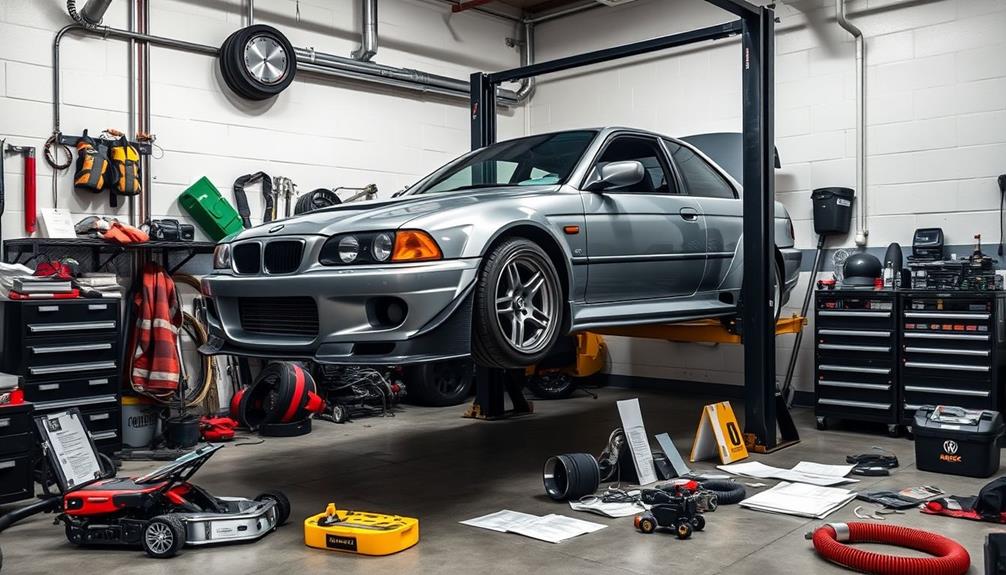
Steering through the legal and safety considerations of car tuning is essential to confirm your modifications don't lead to complications. Ignoring these factors could result in hefty fines, safety risks, or issues with your vehicle's registration.
Here are three key areas you need to focus on:
- Legal Requirements: Confirm your modifications comply with local emissions laws and federal motor vehicle safety standards. Non-compliance can make your vehicle illegal to drive.
- Insurance Coverage: Tuning can affect your insurance rates or coverage. Always consult your insurance provider before making changes to understand any potential implications.
- Professional Guidance: To avoid safety hazards from improper tuning, seek professional guidance. Experts can help confirm that your upgrades won't compromise your vehicle's safety features.
Types of Car Tuning
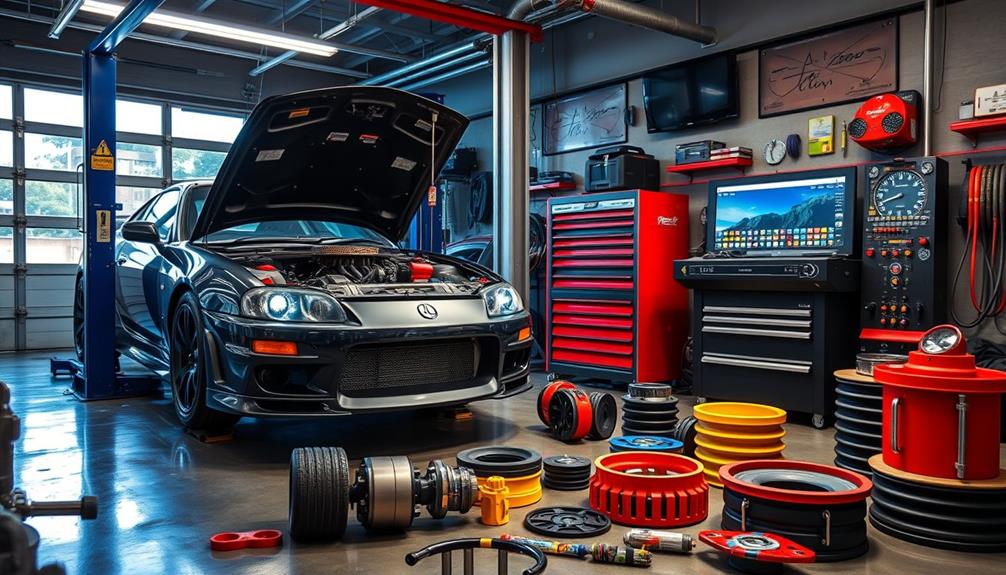
Car tuning encompasses various methods aimed at enhancing your vehicle's performance and aesthetics, each with its unique benefits and costs.
One popular type of tuning is Engine Tuning, which focuses on improving metrics like acceleration and fuel efficiency. This often involves modifications to components such as turbochargers and performance exhaust systems, with costs potentially reaching several thousand dollars.
Another option is Electric Tuning, which adjusts your vehicle's electrical systems for better handling and performance.
If you're looking for a significant power boost, think about Supercharger Installation. This method forces more air into the combustion chamber, typically costing between $2,000 and $10,000.
Exhaust System Modification also enhances your ride by improving both performance and sound, with prices ranging from $500 to $2,000.
If improving fuel efficiency is your goal, Fuel Injection Modification may be the way to go, though it usually requires professional expertise to achieve ideal results.
Lastly, you might want to reflect on a dyno tune, where your vehicle is fine-tuned on a dynamometer to guarantee it runs at its best.
Each type of tuning offers distinct advantages, so choose based on your goals and budget.
Consumer Experiences and Insights
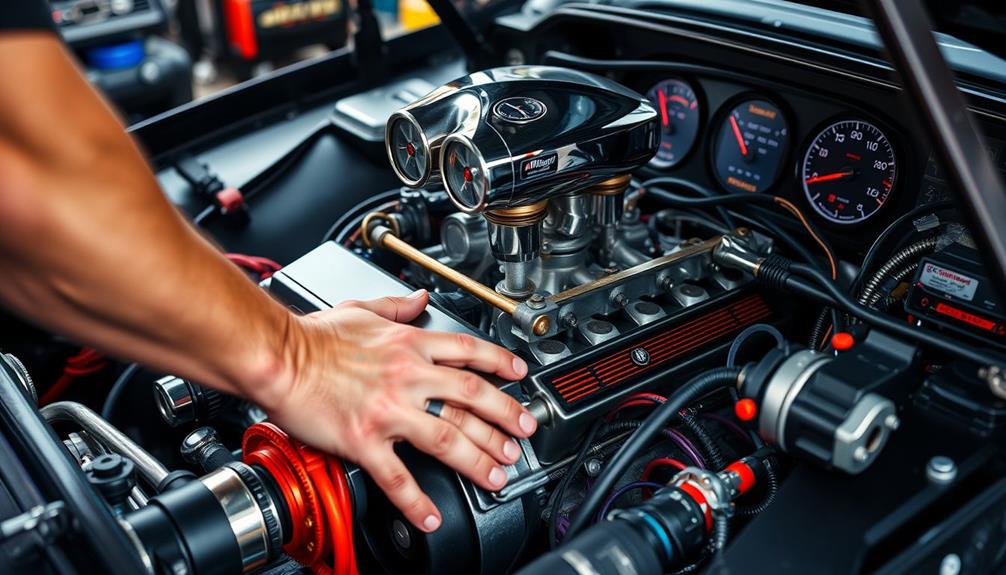
Consumer experiences with car tuning vary widely, often shaped by the choice of tuning method and the reputation of the service provider. Many consumers express skepticism about high tuning prices, especially for basic modifications, questioning whether the performance gains justify the cost.
However, positive feedback often comes from specialized tuning shops that focus on specific models like the Ford Mustang, where customers report better results and higher satisfaction.
Here are three key insights from consumer experiences:
- Reputation Matters: High satisfaction levels usually correlate with the quality and reputation of the tuning shop. Choosing a reputable provider can lead to better performance and fuel economy.
- Remote Tuning Popularity: Many budget-conscious consumers have turned to remote tuning, with some reporting impressive performance gains for under $400. This option appeals to those seeking cost-effective solutions.
- Sharing Experiences: Car enthusiasts frequently discuss their tuning experiences on forums, comparing remote and dyno tuning outcomes. These discussions highlight how expertise can dramatically influence the results of car tuning.
Understanding these insights can help you make an informed decision when considering car tuning.
Frequently Asked Questions
How Much Does It Cost to Have Your Car Tuned?
When you're considering tuning your car, costs can range considerably. Basic tuning starts around $200, but advanced options can climb to $1,500 or more, depending on your vehicle and the performance enhancements you want. It’s important to also consider the car tuning time frame when budgeting for these upgrades. Some basic tuning services can be completed in a day, while more advanced modifications may require several days or even weeks to complete. This can impact the overall cost, as labor fees and shop storage fees may be incurred. Be sure to factor in the time frame for your car tuning when planning and budgeting for the project.
Is Tuning Your Car Worth It?
Tuning your car's like revealing a hidden treasure chest of performance! It's absolutely worth it if you crave enhanced horsepower and efficiency. Just guarantee you weigh the costs against the thrilling benefits you'll experience.
What Is a Stage 1 Tune?
A Stage 1 tune optimizes your car's engine performance through basic ECU remapping. It boosts horsepower by 10-20%, enhancing acceleration without major modifications, making it a great choice for stock vehicles like yours.
Does Tuning a Car Increase Its Value?
Yes, tuning your car can increase its value, especially with popular modifications. Buyers often pay more for enhanced performance and unique features, but guarantee the upgrades are high-quality to avoid deterring potential buyers.
Conclusion
Before diving into car tuning, remember that costs can vary widely based on your car's make, model, and the type of modifications you're considering. While many believe that more expensive upgrades guarantee better performance, that's not always true. Sometimes, a simple tweak can yield impressive results without breaking the bank. Do your research, weigh your options, and don't overlook the importance of legality and safety. With the right approach, you can elevate your ride without overspending.
